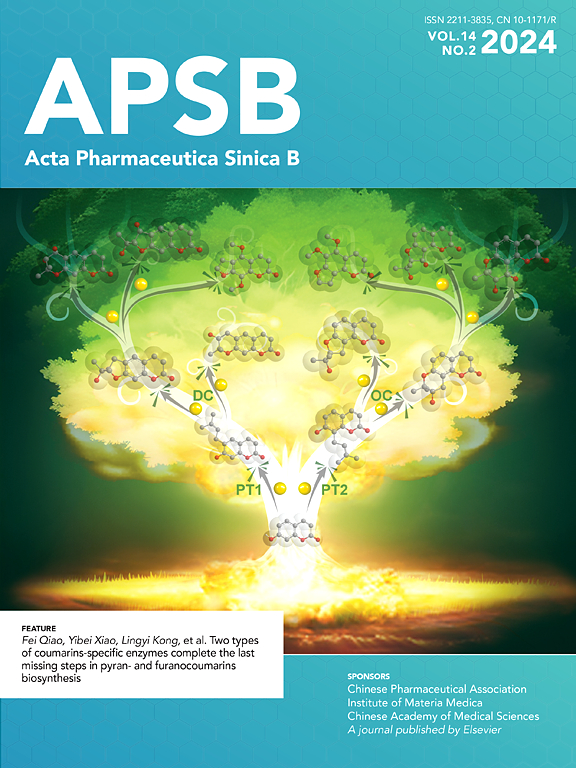靶向降解膜蛋白的gpc3介导溶酶体靶向嵌合体(GLTACs)
IF 14.7
1区 医学
Q1 PHARMACOLOGY & PHARMACY
引用次数: 0
摘要
膜蛋白降解是靶向蛋白降解(TPD)研究的一个前沿领域。在此,我们开发了glypican-3 (GPC3)介导的溶酶体靶向嵌合体(GLTACs)作为靶向降解肿瘤特异性膜蛋白的新策略。gltac利用肿瘤特异性表达和GPC3的内吞特性来降解膜蛋白。通过将gpc3靶向肽与感兴趣蛋白配体(POI)偶联,gltac诱导形成三元复合物,该复合物内化到溶酶体中,导致POI的降解。通过设计PD-L1、c-Met和FGFR1降解剂,验证了gltac的有效性和特异性。特别是,GLTAC WP0能有效降解PD-L1并诱导t细胞介导的针对HepG2细胞的肿瘤杀伤,突出了潜在的治疗应用。GLTAC技术的发展扩大了TPD策略的范围,并为发现针对具有挑战性的蛋白质靶点的新治疗方式开辟了新的途径。本文章由计算机程序翻译,如有差异,请以英文原文为准。

GPC3-mediated lysosome-targeting chimeras (GLTACs) for targeted degradation of membrane proteins
Membrane protein degradation is a cutting-edge field in targeted protein degradation (TPD). Herein, we developed glypican-3 (GPC3)-mediated lysosome-targeting chimeras (GLTACs) as a novel strategy for the targeted degradation of tumor-specific membrane proteins. GLTACs utilize tumor-specific expression and endocytosis properties of GPC3 to degrade membrane proteins. By conjugating a GPC3-targeting peptide with the ligand of protein of interest (POI), GLTACs induce the formation of a ternary complex that is internalized into lysosomes, leading to the degradation of the POI. The effectiveness and specificity of GLTACs were validated by designing PD-L1, c-Met, and FGFR1 degraders. In particular, GLTAC WP0 potently degraded PD-L1 and induced T-cell-mediated tumor killing against HepG2 cells, highlighting the potential therapeutic applications. The development of GLTAC technology expands the scope of TPD strategies and opens new avenues for discovering novel therapeutic modalities against challenging protein targets.
求助全文
通过发布文献求助,成功后即可免费获取论文全文。
去求助
来源期刊

Acta Pharmaceutica Sinica. B
Pharmacology, Toxicology and Pharmaceutics-General Pharmacology, Toxicology and Pharmaceutics
CiteScore
22.40
自引率
5.50%
发文量
1051
审稿时长
19 weeks
期刊介绍:
The Journal of the Institute of Materia Medica, Chinese Academy of Medical Sciences, and the Chinese Pharmaceutical Association oversees the peer review process for Acta Pharmaceutica Sinica. B (APSB).
Published monthly in English, APSB is dedicated to disseminating significant original research articles, rapid communications, and high-quality reviews that highlight recent advances across various pharmaceutical sciences domains. These encompass pharmacology, pharmaceutics, medicinal chemistry, natural products, pharmacognosy, pharmaceutical analysis, and pharmacokinetics.
A part of the Acta Pharmaceutica Sinica series, established in 1953 and indexed in prominent databases like Chemical Abstracts, Index Medicus, SciFinder Scholar, Biological Abstracts, International Pharmaceutical Abstracts, Cambridge Scientific Abstracts, and Current Bibliography on Science and Technology, APSB is sponsored by the Institute of Materia Medica, Chinese Academy of Medical Sciences, and the Chinese Pharmaceutical Association. Its production and hosting are facilitated by Elsevier B.V. This collaborative effort ensures APSB's commitment to delivering valuable contributions to the pharmaceutical sciences community.
 求助内容:
求助内容: 应助结果提醒方式:
应助结果提醒方式:


